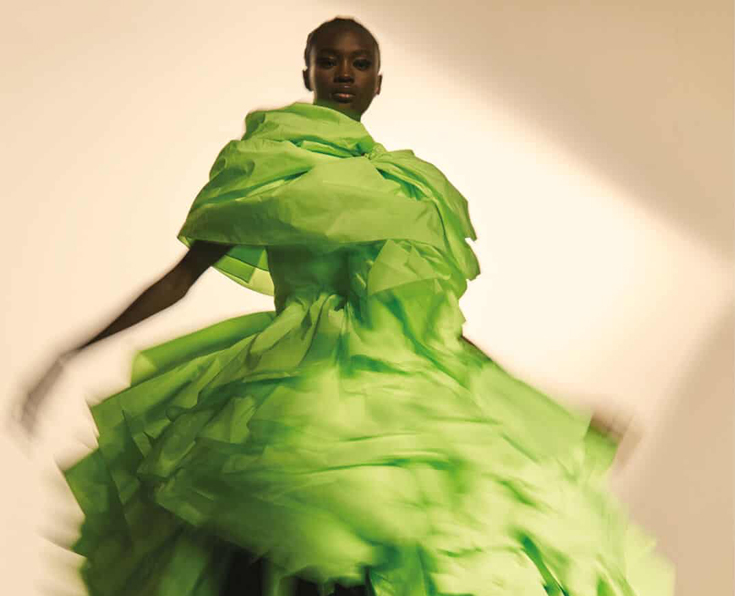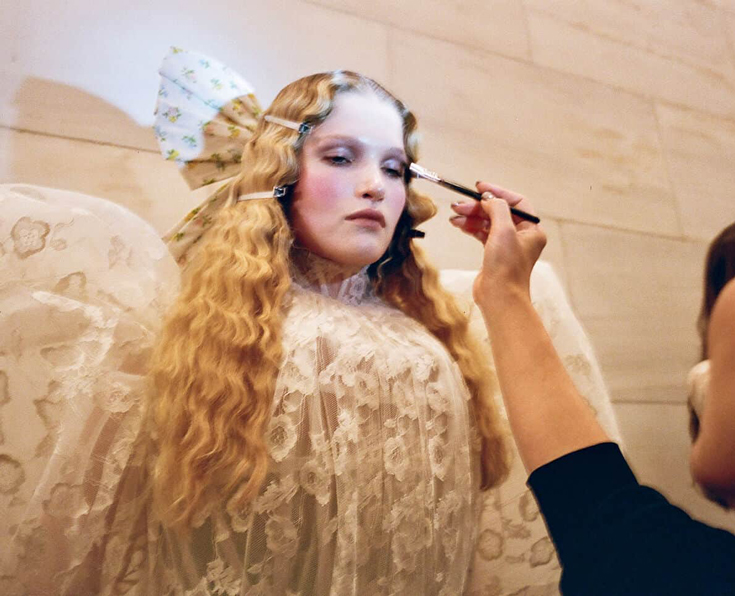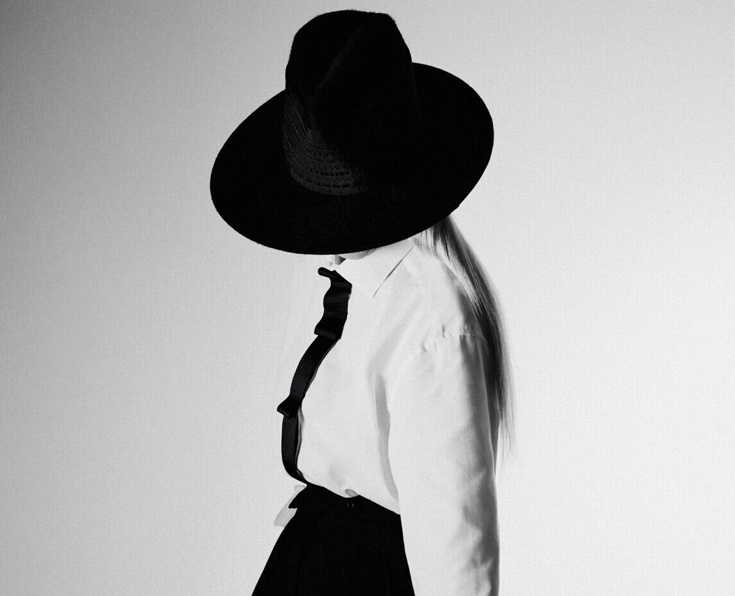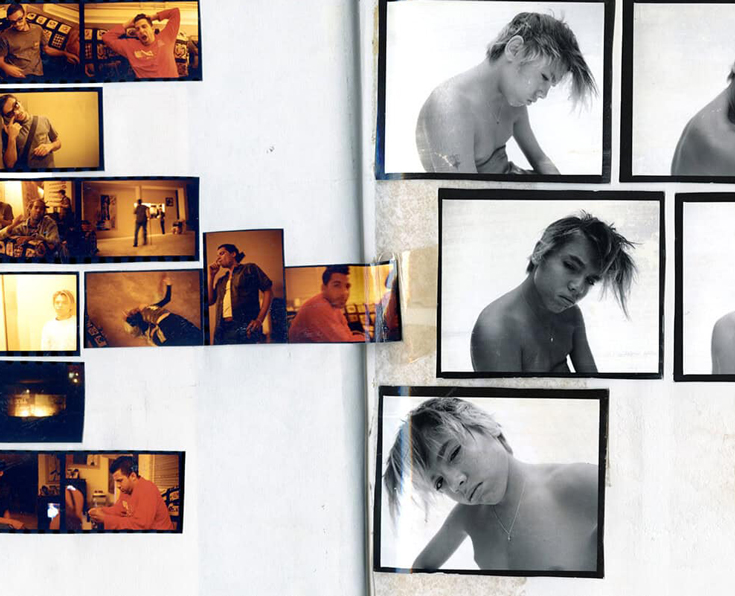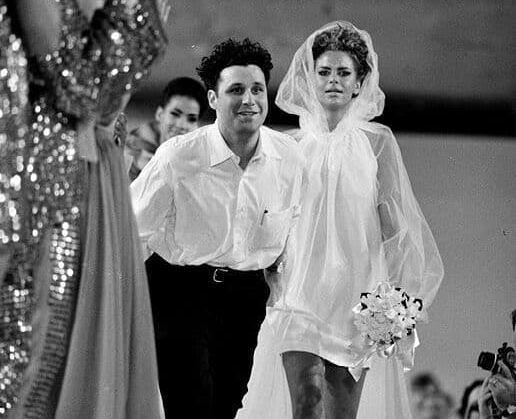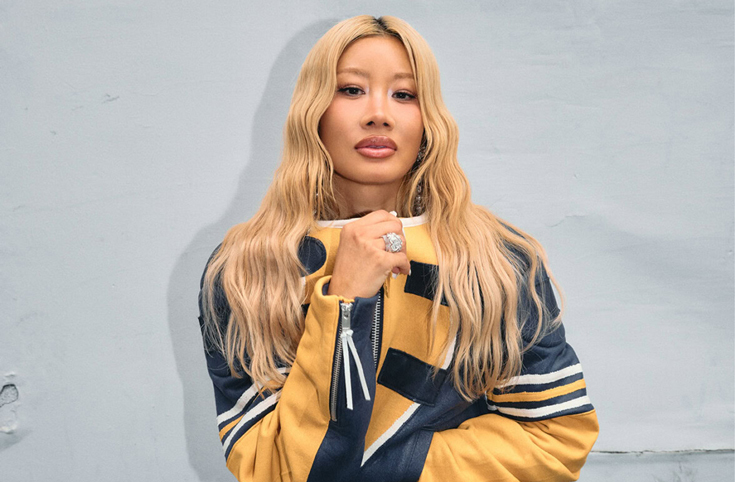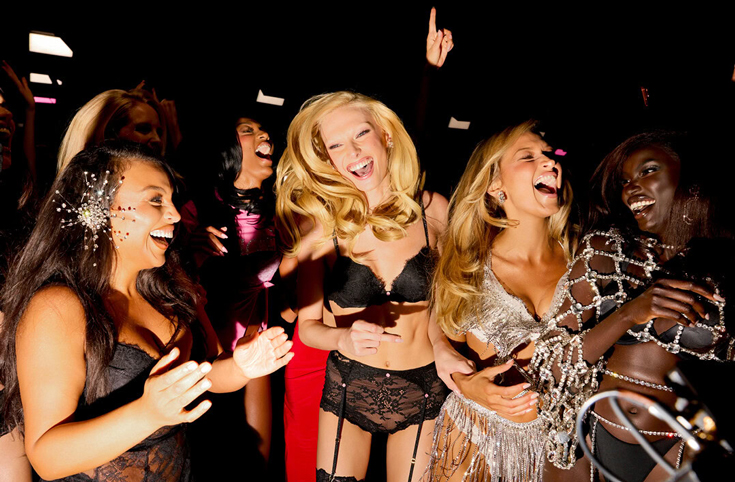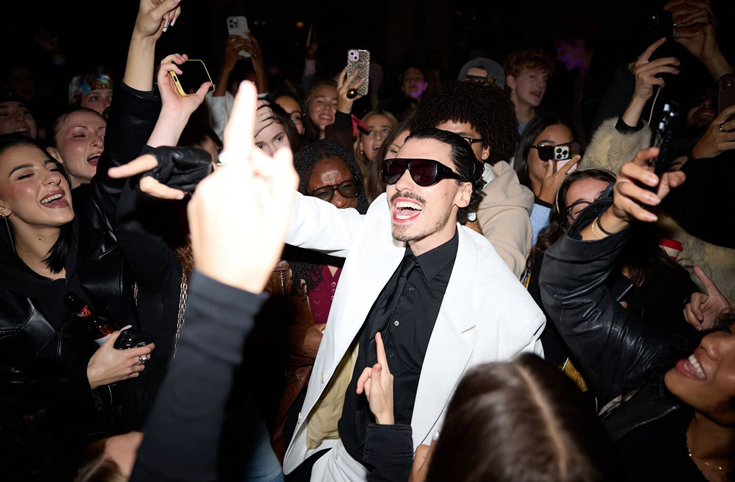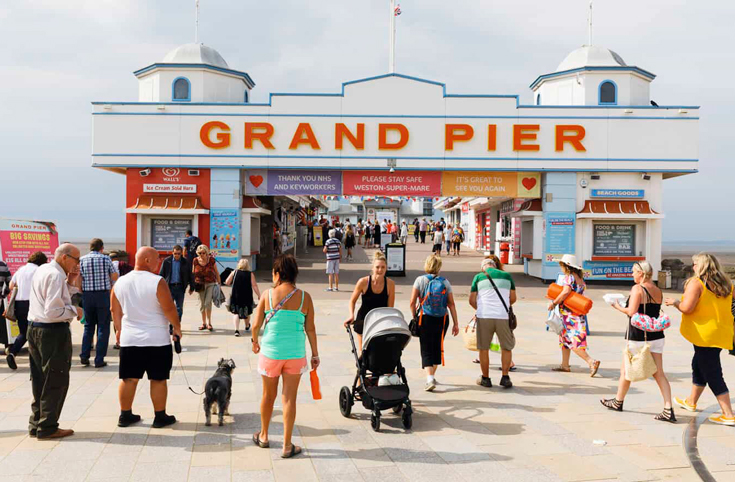ANGIE MCMAHON: WHEN THE SUN RISES

Angie McMahon has found the light. The Melbourne artist has cemented herself as one of the most thoughtful, poignant songwriters in Australia in the last year through the relatability, activism and determination in her music, which reflects the hopefulness and humanity of her generation. With her critically acclaimed second studio album released last year, Light, Dark, Light Again, which cut through to a wider audience, she’s now completing the chapter with the Light EP, a series of songs too good to leave behind. The evolution of McMahon continues, as she embraces the darkness and welcomes in the light.
“There’s a lot of rawness in the creation of these songs,” she tells me, Zooming in from New Zealand, where she’s on a sold-out tour. “I had never failed so hard as I did in this period of my life when I was writing this stuff. These songs very much live alongside last year’s record and now have their own little home. It was cathartic to be able to finish them off.” That rawness and failure has led to some of her most potent work. McMahon, 30, drew us in with her determination on Mother Nature when she chanted, “the pulse of the future is in Mother Nature,” a mantra for her overarching beliefs; her raw vulnerability on Black Eye, “the bleeding and blue / I don’t feel bad for loving you”; her optimism on Divine Fault Line: “I’m learning to love my skin / I’m learning to dive right in… / I’m starting to dance again”; and her honesty on Making It Through, as she sings, “when I grow up, I want to be like a tree helping people breathe / but all I’ve achieved lately is making it through.”
On the new EP, she fulfils that purpose, like on Just Like North, where she sings, “If you get everything right there’s nothing left,” which feels like the culmination of everything she has learned thus far. “I was living by myself and talking to other songwriter friends. And we were encouraging each other to write songs in a way that was a little bit different to how we usually would, which was nice creatively, to get a push from a different perspectives. We were part of this online community called School of Song where you get prompts and songwriting exercises. So Just Like North was a response to a Mary Oliver poem… I’d never written that way before, but I was isolated at the time, feeling anxious, feeling lost and drawing from other people’s encouragement.” McMahon thinks of herself as a solitary person, as regulating and processing in isolation is where she’s found safety, but since she started this project, she’s been leaning into the power of a larger community that is championing her. “There’s so much that [having a community] brings out of you,” she says. “I think it encourages us to be more generous and more caring as people. The more I’ve leant into community and connection in my work, and also just in my life, the more I like myself. I’ve been on this journey of growing more confident in myself, trusting myself and the people around me, and my ability to open up to people as I get older. [Community] is now one of my core values and I don’t think I was always that way. I don’t think I always understood it.”
McMahon’s connection to nature has played a huge part in her craft. The power of nature – and also her urge to raise awareness around the planet – has been present in all of her songs, from the ambience in the background of the tracks to inspiring songs like her climate-change anthem Mother Nature. There’s a sense of peace McMahon has found from the natural world. “There’s this quote from a writer who I love named Robin Wall Kimmerer [saying], ‘The land knows us even when we’re lost’, and I was just trying to find that understanding myself and finding it in nature. I have a renewed love for the natural world that was helping me pull myself together.” Transcending the music, McMahon’s activism has lit a fire inside her. Climate change, genocide and corporate injustice are all topics she is vocal about, unapologetically speaking up about on stage and on social media. “It’s hard to keep doing the job and keep having dreams for the future and having ambition, whether that dream is that I want to play at this festival, tour that country, live by the ocean or have kids. That stuff is all impacted by what we’re witnessing in the world and I can’t imagine that I’d feel I’d be able to operate authentically if I wasn’t acknowledging it… We’re witnessing huge failings. There are plenty of young people across the board who call it out and I’m inspired by that. I’m drawn to that strength. I think we have a responsibility to fight for our dreams and hold these governments accountable. It’s impacting everyone. Witnessing genocide and climate destruction impacts every continent and every future generation. It’s not about me, it’s about the world we are living in and I want to write about my world – that is my world.” That honesty in her music has shot McMahon into a small but mighty sphere of artists, especially Australian ones, who are using their platform to better humanity.
Historically, artists like Joni Mitchell, Bob Dylan and James Brown are who she cites as guiding lights for songwriters who have rocked the boat by singing about what’s happening around them and moving the needle. Today, Chappell Roan and MUNA are inspiring McMahon, as artists who are creating joyful spaces and engaging in progressive activism. “We need that as humans. Spaces to dance and cultivate community, those queer joy spaces. I’m moved by anyone who’s protesting and movements for change. We’re witnessing a real season of uprising and I think it’s so important and powerful. It’s inspiring to me because it breeds hope. Specifically, if you’re talking about artists posting about Palestine, there was a moment in time where it felt quite scary because the music industry feels a bit dangerous… like you could come under attack. But when other artists do it, it makes each other stronger and we educate each other and become more aligned. The world can keep changing for the better. I sound like a hippie, but this is the way to do it.”
This has all been part of the puzzle, as McMahon navigates her artistic and personal identity both physically and mentally. Her style has played into this. “My style is an expression of who I am, or where I am at emotionally, how I’m feeling about my sexuality or gender at any given time. Over the last few years, I think I’ve become more confident in my body, more comfortable in my body, as a woman. And I feel more able to experiment with expressing myself and my feelings in a visual way, rather than performing for an imaginary judge or the male gaze.” The hardest challenge she’s faced so far has been her own psyche. “A few years ago my life was falling apart. Some of the big foundational relationships around me came undone and I was afraid of letting them go. I was afraid of failing. It was a big thing for me to move through and I went through some big panic attacks and became physically unwell because I was repressing and holding a lot of that stuff in. I look back and that was my rock bottom, and now there’s been a whole journey of climbing out of it.” Writing about that journey is what McMahon thinks has resonated with so many people through the music she has released in the last year. “It was written when I was going through big shifts. It’s evolved into something that is for other people, but I was writing it for myself. I was in need of self-compassion and a way to process things, to respond to the hard stuff in my life and try to understand it. I was using songs to do that because that’s all I know how to do. It speaks to us needing guidance when we’re going through change and transition. That’s what everyone is connecting to in the record – it’s a universal, uphill battle we’re going through. Anything that’s trying to acknowledge that and making some positive light out of it is helpful or gives us an anchor.”
As she sits in her hotel room in New Zealand on her tour, McMahon reflects on how she’s right in the best moment of her journey. “This has been the closest I’ve felt to having a positive effect on the world. I have the best relationship I’ve ever had with myself. I went through this crash and burn chapter and now I’m out on the other side. I’m feeling like my life is meaningful. I feel successful and satisfied with my work, which is such a relief.” Right now, she’s hopeful for the power of people being able to shift the rules and create systemic change. She wants to see people dancing, singing and marching together. For her next chapter, she thinks it will involve dancing and colour. “I haven’t figured out what’s next, but that’s kind of what’s great.”
Taken from Issue 24 of 10 Magazine Austalia, out now.
Photographer JAMES J. ROBINSON
Fashion Editor ABBY BENNETT
Text ROXY LOLA
Talent ANGIE McMAHON
Hair and make-up GEORGIA GAILLARD using Oribe and R&Co from Rouge Beauty
Photographer’s assistant MIRABAI HAZELL
Fashion assistants LAUREN FARRELL and RUBY THOMPSON
Production R D PRODUCTIONS













